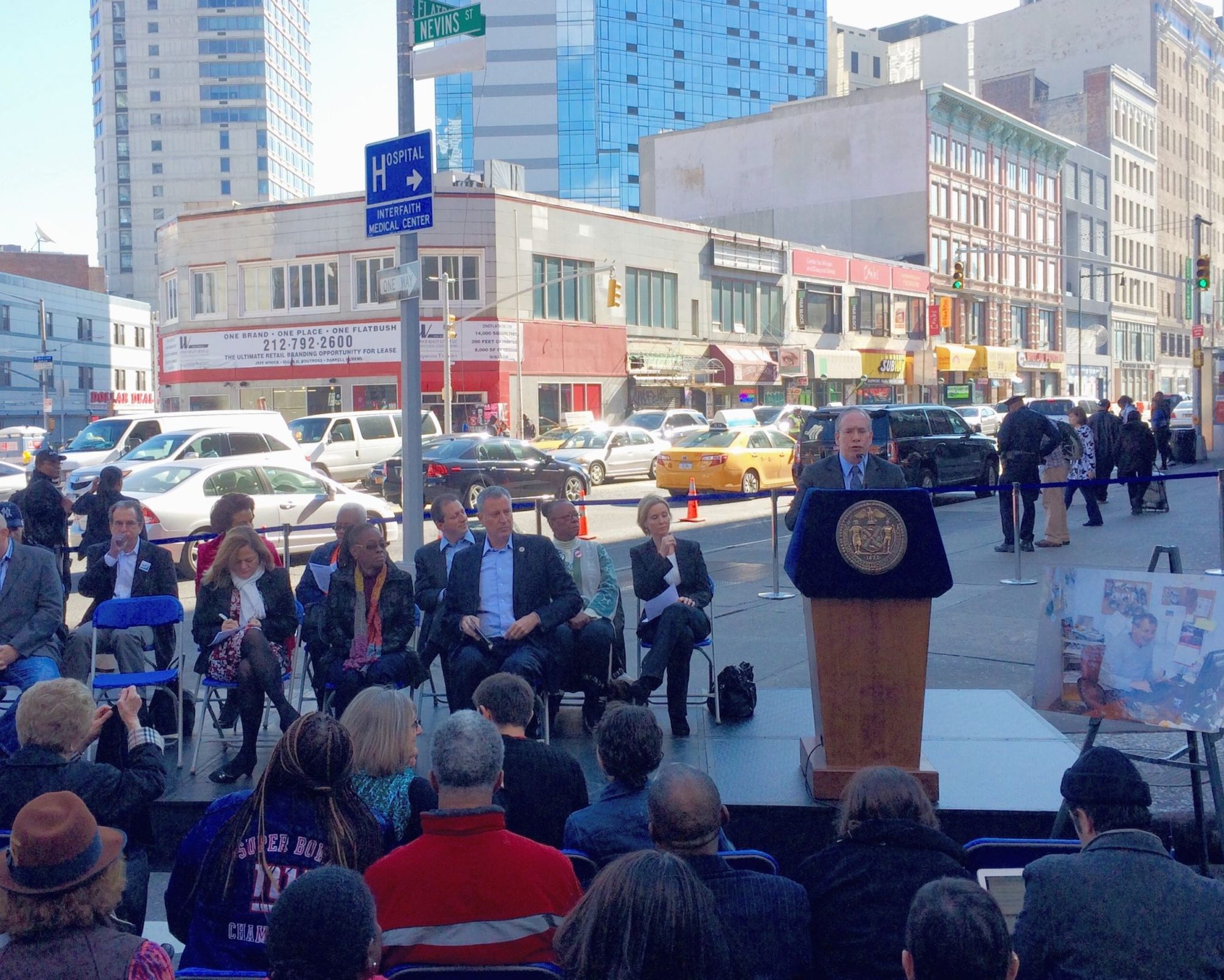Jon Kest’s Legacy Celebrated At Weekend Street Naming

Gathering Saturday morning on Nevins Street between Flatbush and Livingston, where Jon Kest helped lead a movement to better the lives of the poor and working class in New York City, elected officials and community organizers remembered Jon as a man who worked tirelessly for decades for social justice – and paved the way for a progressive city that, from the offices of grassroots organizations to City Hall, strives to better the lives of its underserved residents.
“Jon was, quite simply, the most innovative, the most well respected, the most beloved community organizer among poor and working class people in New York City,” said actress Cynthia Nixon, who led Saturday’s event, during which Nevins Street, between Flatbush and Livingston, was officially co-named for Jon, who died in 2012 after a battle with cancer. The street is now co-named Jon Kest Way.
The ceremony, which was attended by Jon’s family – including his wife Fran Streich, son Jake, sister Amy, and parents Martin and Ruth, was held by the headquarters of both New York Communities For Change, where Jon served as the executive director, and the Working Families Party, which he helped to found. The building previously was home to ACORN, which Jon also helped to form. Saturday’s event also drew a long list of elected officials, including Mayor Bill de Blasio; Councilmen Brad Lander and Stephen Levin, who sponsored the legislation to co-name the street; Public Advocate Letitia James; City Comptroller Scott Stringer; and many others.

“Jon is not beaming down upon us this morning – in fact, I’m pretty sure he’s got this incredulous look on his face with that wry but irritated smile – ‘What the? You’re doing what? It’s 10 days before a critical election that could determine if we win a minimum wage increase for hundreds of thousands of people and you’re at a street naming? For me?'” Lander laughed. “… And he’s right, of course, as usual. I miss that look a lot. I got used to it over the years of my friendship with Jon.”
Like Lander, Levin remembered Jon as someone who pushed everyone to support low-income tenants, fast food workers, and anyone who’d been disenfranchised and pushed aside.
“We are in a new era of government – we’re in a progressive era, and that means doing everything possible to focus on the needs of low-income New Yorkers and New Yorkers that need a helping hand and are looking for a fair wage and fair benefits,” Levin said. “In so many ways, Jon really was the architect for this – where we are as a city today.”
The mayor, too, credited Jon with many of the policies that are being put in place in the city – such as the paid sick leave law that recently went into effect.
“We now have paid sick leave on a grand scale in New York City, and Jon Kest was one of the people who gave life to that,” de Blasio said.
James credited Jon with helping her become public advocate.
“Jon lives on in my heart and in the hearts of all New Yorkers, especially Brooklynites,” James said. “I am the public advocate because of Jon Kest.”
“He was a legend,” James continued. “There’s no other way to describe him. His commitment to social justice, his ability to organize and turn out crowds – he was, by any barometer, an extraordinary leader.”
Stringer echoed James’ sentiment, saying, “there’s no way I’d be comptroller without his strategy, his organizing, and his passion.”
Remembering a speech Jon gave at a gathering at his home, Stringer said, “he talked in a low voice – he didn’t have a prepared speech, but he looked everyone in the eye and said, ‘We have to engage.’ People believed in Jon Kest – they saw the vision. Let’s face it, years ago no one could imagine what this government would be today – none of us. Everyone had hopes and dreams but nobody believed, nobody truly believed, that we, as progressives, could be successful – but Jon Kest did, and children born today will have a better life because of him.”
Jonathan Westin, now the executive director at New York Communities for Change, said in an email to supporters that those who want to get involved with the work that Jon Kest began can do so by making a contribution to the Jon Kest Legacy Fund.
From Westin’s email:
Over the course of his life Jon’s work helped shape the history of New York State. From organizing for fair school funding or the affordable housing organizing that Jon did with his wife and organizing partner, Fran Streich, to launching what would become a national movement of fast food workers organizing for $15/hour and the right to form a union without retaliation; Jon’s legacy will live on in the lives of the people that his organizing impacted but also a part of the city itself.
But Jon’s work lives on in more than just our hearts and memory. It’s been almost two years since I became NYCC’s Executive Director but Jon’s vision and legacy continue to guide our work today. Jon taught me how to be bold, how to think about the kind of change working people can create in our state. He also taught me that without skilled organizers on the ground in our communities, we will never create the kind of change we need.
That’s why the New York Communities Organizing Fund, Inc. (NYCOFI) created the Jon Kest Strategic Action Legacy Fund in honor of Jon’s memory. The goal of the legacy fund is to recruit and train organizers and leaders of color to continue the fight for social and economic justice in our state.
“[Jon] was such a fundamentally optimistic human being – he taught us to overcome our narrowness, our sense of limitation – think about that, what an incredible gift to the world,” Mayor de Blasio summed things up during Saturday’s ceremony.
“[The] ideas he put in motion that are now reality – they’re not benefiting hundreds of people, thousands of people – the ideas Jon put in motion are benefiting millions of people. And that is a very good life.”
Reporting by Anna Gustafson
